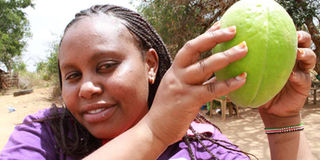Forget cotton, we’ll soon make clothes from this wild fruit

Ms Agnes Gacuiri, a research technician at the World Agroforestry Centre displays a Calotropis Procera fruit at Kyumani Village in Makueni County. World Agroforestry Centre scientists are studying the plant, which produces a super textile fibre, with a view of promoting its domestication. PHOTO | PIUS MAUNDU | NMG
What you need to know:
- Scientists identifying best varieties to plant.
- The Kenyan scientists are collaborating with Chinese textile manufacturers, who have already given the fibre a thumbs up.
- The plant grows naturally in Baringo, Kajiado, Makueni, Tharaka Nithi and Turkana counties.
- The research is also expected to come up with ways of managing the fibre after it is extracted from the plant to curb post-harvest losses.
Textile manufactures will soon have a new raw material to choose from alongside cotton, silk or wool after an ongoing study on Calotropis procera, a wild plant, returned favourable results.
The plant grows mainly in arid regions and its fruits have been found to produce quality fibre.
A team of scientists is studying the ignored plant that thrives naturally in dry climates to explore the possibility of domesticating it for the production of fibre.
The study follows the revelation by preliminary findings that the fruits of Calotropis procera yield fibre with silk-like qualities.
“We are looking at a super fibre whose qualities fall between that of cotton and silk,” lead researcher Dr Alice Muchugi told Seeds of Gold.
Dr Muchugi heads the Genetics Resources Unit at the World Agroforestry Centre (Icraf), the agency coordinating the study.
She is working closely with three doctorate students from Moi University and South Eastern Kenya University in carrying out the study.
The Kenyan scientists are collaborating with Chinese textile manufacturers, who have already given the fibre a thumps up.
“Our concern has shifted to ensuring that the supply of Calotropis procera fibre is guaranteed to meet the industrial demands and that is why we are exploring domestication of the plant,” said Dr Muchugi.
Calotropis procera is a perennial plant with broad evergreen leaves. The fruit is a green pod, measuring about 8–12 cm long, rounded at the base but shortly pointed at the tip and contains numerous seeds.
The seeds are brown, flattened and have a tuft of long white hair on one end.
THRIVES UNDER VARIED CLIMATIC CONDITIONS
The plant grows naturally in Baringo, Kajiado, Makueni, Tharaka Nithi and Turkana counties.
The scientists have established demonstration plots in Makueni and Tharaka Nithi counties where domestication of the plant has been tested.

A man harvests the Calotropis Procera fruits at Thange Village in Makueni County. The plant grows mainly in arid regions. PHOTO | PIUS MAUNDU | NMG
They have been working with locals to collect the fibre from the plant’s natural habitat. The scientists are buying the fruits from the collectors at Sh1,000.
Among the aspects that the scientists are interested in is the plant’s growth behaviours and how its various types thrive under various climatic conditions.
The researchers are also eager to find out how the plant should be spaced for maximum yield, according to Dr Muchugi.
The research is also expected to come up with ways of managing the fibre after it is extracted from the plant to curb post-harvest losses.
“Calotropis Procera fibre from Makueni has been of the highest quality,” Joyce Kasyoki, a project manager at Icraf said this week when she led a team from the agency in collecting the fibre for shipping to China.
Although the resulting fibre is said to be light, Dr Muchugi is optimistic that its strength and other qualities can be improved over time through genetic engineering.
“At this stage, we are working on identifying and selecting the best varieties with a view to improving them in future as the textile manufacturers further study the fibre,” says Dr Muchugi.
Once commercialised, Dr Muchugi says farmers would be allowed to grow the plant and sell the fruits as there is a ready market.





